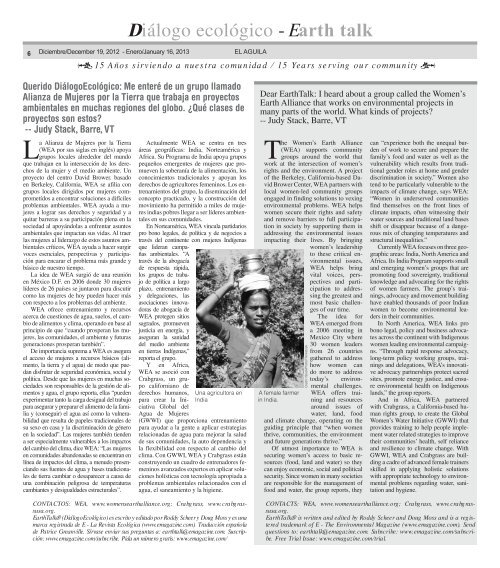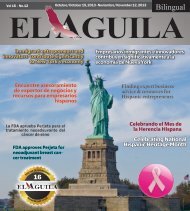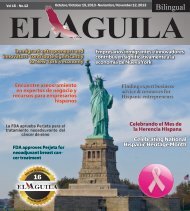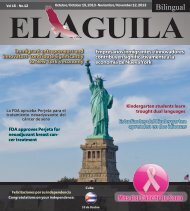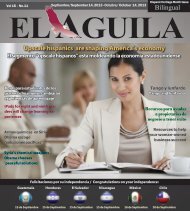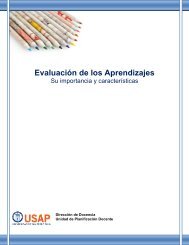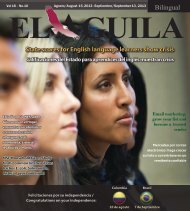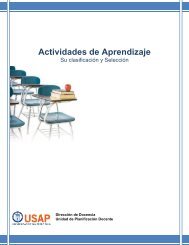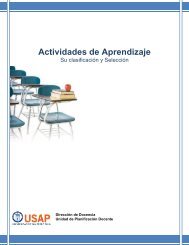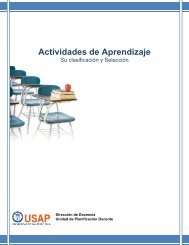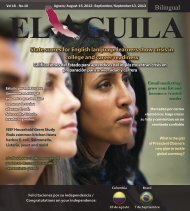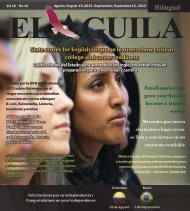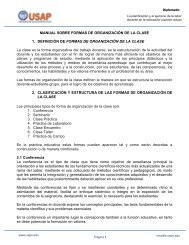diciembre2012
You also want an ePaper? Increase the reach of your titles
YUMPU automatically turns print PDFs into web optimized ePapers that Google loves.
6<br />
Diciembre/December 19, 2012 - Enero/January 16, 2013<br />
Diálogo ecológico -Earth talk<br />
EL AGUILA<br />
15 Años sirviendo a nuestra comunidad / 15 Years serving our community <br />
Querido DiálogoEcológico: Me enteré de un grupo llamado<br />
Alianza de Mujeres por la Tierra que trabaja en proyectos<br />
ambientales en muchas regiones del globo. ¿Qué clases de<br />
proyectos son estos?<br />
-- Judy Stack, Barre, VT<br />
La Alianza de Mujeres por la Tierra<br />
(WEA por sus siglas en inglés) apoya<br />
grupos locales alrededor del mundo<br />
que trabajan en la intersección de los derechos<br />
de la mujer y el medio ambiente. Un<br />
proyecto del centro David Brower. basado<br />
en Berkeley, California, WEA se afilia con<br />
grupos locales dirigidos por mujeres comprometídos<br />
a encontrar soluciones a difíciles<br />
problemas ambientales. WEA ayuda a mujeres<br />
a lograr sus derechos y seguridad y a<br />
quitar barreras a su participación plena en la<br />
sociedad al apoyándolas a enfrentar asuntos<br />
ambientales que impactan sus vidas. Al traer<br />
las mujeres al liderazgo de estos asuntos ambientales<br />
críticos, WEA ayuda a hacer surgir<br />
voces esenciales, perspectivas y participación<br />
para encarar el problema más grande y<br />
básico de nuestro tiempo.<br />
La idea de WEA surgió de una reunión<br />
en México D.F. en 2006 donde 30 mujeres<br />
líderes de 26 países se juntaron para discutir<br />
como las mujeres de hoy pueden hacer más<br />
con respecto a los problemas del ambiente.<br />
WEA ofrece entrenamiento y recursos<br />
acerca de cuestiones de agua, suelos, el cambio<br />
de alimentos y clima, operando en base al<br />
principio de que “cuando prosperan las mujeres,<br />
las comunidades, el ambiente y futuras<br />
generaciones prosperan también”.<br />
De importancia suprema a WEA es asegura<br />
el acceso de mujeres a recursos básicos (alimento,<br />
la tierra y el agua) de modo que puedan<br />
disfrutar de seguridad económica, social y<br />
política. Desde que las mujeres en muchas sociedades<br />
son responsables de la gestión de alimentos<br />
y agua, el grupo reporta, ellas “pueden<br />
experimentar tanto la carga desigual del trabajo<br />
para asegurar y preparar el alimento de la familia<br />
y (conseguir) el agua así como la vulnerabilidad<br />
que resulta de papeles tradicionales de<br />
su sexo en casa y la discriminación de género<br />
en la sociedad”. Las mujeres también tienden<br />
a ser especialmente vulnerables a los impactos<br />
del cambio del clima, dice WEA: “Las mujeres<br />
en comunidades abandonadas se encuentran en<br />
línea de impactos del clima, a menudo presenciando<br />
sus fuentes de agua y bases tradicionales<br />
de tierra cambiar o desaparecer a causa de<br />
una combinación peligrosa de temperaturas<br />
cambiantes y desigualdades estructurales”.<br />
Actualmente WEA se centra en tres<br />
áreas geográficas: India, Norteamérica y<br />
Africa. Su Programa de India apoya grupos<br />
pequeños emergentes de mujeres que promueven<br />
la soberanía de la alimentación, los<br />
conocimientos tradicionales y apoyan los<br />
derechos de agricultores femeninos. Los entrenamientos<br />
del grupo, la diseminación del<br />
concepto practicado, y la construcción del<br />
movimiento ha permitido a miles de mujeres<br />
indias pobres llegar a ser líderes ambientales<br />
en sus comunidades.<br />
En Norteamérica, WEA vincula partidarios<br />
pro bono legales, de política y de negocios a<br />
través del continente con mujeres Indígenas<br />
que lideran campañas<br />
ambientales. “A<br />
través de la abogacía<br />
de respuesta rápida,<br />
los grupos de trabajo<br />
de política a largo<br />
plazo, entrenamiento<br />
y delegaciones, las<br />
asociaciones innovadoras<br />
de abogacía de<br />
WEA protegen sitios<br />
sagrados, promueven<br />
justicia en energía, y<br />
aseguran la sanidad<br />
del medio ambiente<br />
en tierras Indígenas,”<br />
reporta el grupo.<br />
Y en Africa,<br />
WEA se asoció con<br />
Crabgrass, un gru-<br />
po californiano de<br />
derechos humanos,<br />
para crear la Iniciativa<br />
Global del<br />
Agua de Mujeres<br />
Una agricultora en<br />
India<br />
(GWWI) que proporciona entrenamiento<br />
para ayudar a la gente a aplicar estrategias<br />
relacionadas de agua para mejorar la salud<br />
de sus comunidades, la auto dependencia y<br />
la flexibilidad con respecto al cambio del<br />
clima. Con GWWI, WEA y Crabgrass están<br />
construyendo un cuadro de entrenadores femeninos<br />
avanzados expertos en aplicar soluciones<br />
holísticas con tecnología apropiada a<br />
problemas ambientales relacionados con el<br />
agua, el saneamiento y la higiene.<br />
CONTACTOS: WEA, www.womensearthalliance.org; Crabgrass, www.crabgrassusa.org.<br />
EarthTalk® (DiálogoEcológico) es escrito y editado por Roddy Scheer y Doug Moss y es una<br />
marca registrada de E - La Revista Ecológica (www.emagazine.com). Traducción española<br />
de Patrice Greanville. Sírvase enviar sus preguntas a: earthtalk@emagazine.com. Suscripción:<br />
www.emagazine.com/subscribe. Pida un número gratis: www.emagazine.com/<br />
Dear EarthTalk: I heard about a group called the Women’s<br />
Earth Alliance that works on environmental projects in<br />
many parts of the world. What kinds of projects?<br />
-- Judy Stack, Barre, VT<br />
The Women’s Earth Alliance<br />
(WEA) supports community<br />
groups around the world that<br />
work at the intersection of women’s<br />
rights and the environment. A project<br />
of the Berkeley, California-based David<br />
Brower Center, WEA partners with<br />
local women-led community groups<br />
engaged in finding solutions to vexing<br />
environmental problems. WEA helps<br />
women secure their rights and safety<br />
and remove barriers to full participation<br />
in society by supporting them in<br />
addressing the environmental issues<br />
impacting their lives. By bringing<br />
women’s leadership<br />
to these critical environmental<br />
issues,<br />
WEA helps bring<br />
vital voices, perspectives<br />
and participation<br />
to addressing<br />
the greatest and<br />
most basic challenges<br />
of our time.<br />
The idea for<br />
WEA emerged from<br />
a 2006 meeting in<br />
Mexico City where<br />
30 women leaders<br />
from 26 countries<br />
gathered to address<br />
how women can<br />
do more to address<br />
today’s environmental<br />
challenges.<br />
A female farmer WEA offers trai-<br />
in India.<br />
ning and resources<br />
around issues of<br />
water, land, food<br />
and climate change, operating on the<br />
guiding principle that “when women<br />
thrive, communities, the environment<br />
and future generations thrive.”<br />
Of utmost importance to WEA is<br />
securing women’s access to basic resources<br />
(food, land and water) so they<br />
can enjoy economic, social and political<br />
security. Since women in many societies<br />
are responsible for the management of<br />
food and water, the group reports, they<br />
Credit: iStockPhoto/Thinkstock<br />
can “experience both the unequal burden<br />
of work to secure and prepare the<br />
family’s food and water as well as the<br />
vulnerability which results from traditional<br />
gender roles at home and gender<br />
discrimination in society.” Women also<br />
tend to be particularly vulnerable to the<br />
impacts of climate change, says WEA:<br />
“Women in underserved communities<br />
find themselves on the front lines of<br />
climate impacts, often witnessing their<br />
water sources and traditional land bases<br />
shift or disappear because of a dangerous<br />
mix of changing temperatures and<br />
structural inequalities.”<br />
Currently WEA focuses on three geographic<br />
areas: India, North America and<br />
Africa. Its India Program supports small<br />
and emerging women’s groups that are<br />
promoting food sovereignty, traditional<br />
knowledge and advocating for the rights<br />
of women farmers. The group’s trainings,<br />
advocacy and movement building<br />
have enabled thousands of poor Indian<br />
women to become environmental leaders<br />
in their communities.<br />
In North America, WEA links pro<br />
bono legal, policy and business advocates<br />
across the continent with Indigenous<br />
women leading environmental campaigns.<br />
“Through rapid response advocacy,<br />
long-term policy working groups, trainings<br />
and delegations, WEA’s innovative<br />
advocacy partnerships protect sacred<br />
sites, promote energy justice, and ensure<br />
environmental health on Indigenous<br />
lands,” the group reports.<br />
And in Africa, WEA partnered<br />
with Crabgrass, a California-based human<br />
rights group, to create the Global<br />
Women’s Water Initiative (GWWI) that<br />
provides training to help people implement<br />
water related strategies to improve<br />
their communities’ health, self reliance<br />
and resilience to climate change. With<br />
GWWI, WEA and Crabgrass are building<br />
a cadre of advanced female trainers<br />
skilled in applying holistic solutions<br />
with appropriate technology to environmental<br />
problems regarding water, sanitation<br />
and hygiene.<br />
CONTACTS: WEA, www.womensearthalliance.org; Crabgrass, www.crabgrassusa.org.<br />
EarthTalk® is written and edited by Roddy Scheer and Doug Moss and is a registered<br />
trademark of E - The Environmental Magazine (www.emagazine.com). Send<br />
questions to: earthtalk@emagazine.com. Subscribe: www.emagazine.com/subscribe.<br />
Free Trial Issue: www.emagazine.com/trial.


